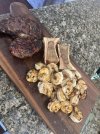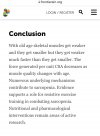For me mostly beef, some eggs, some sardines, sometimes chicken though it's not fat enough and pork rarely. Cows, sheep, bison, deer, elk, have much better essential fatty acid ratio than even pasture raised poultry and pigs. Not a deal breaker but better is better. I still am getting obvious physical healing benefits so will continue. Plan is to re-evaluate in the fall and maybe add back some carbs.
Almost everyone gets the runs for a few weeks though some do need longer for their liver to adapt to producing enough bile to deal with all the fat. #1 r ule for the diet is "NEVER trust a ^*#%!"


